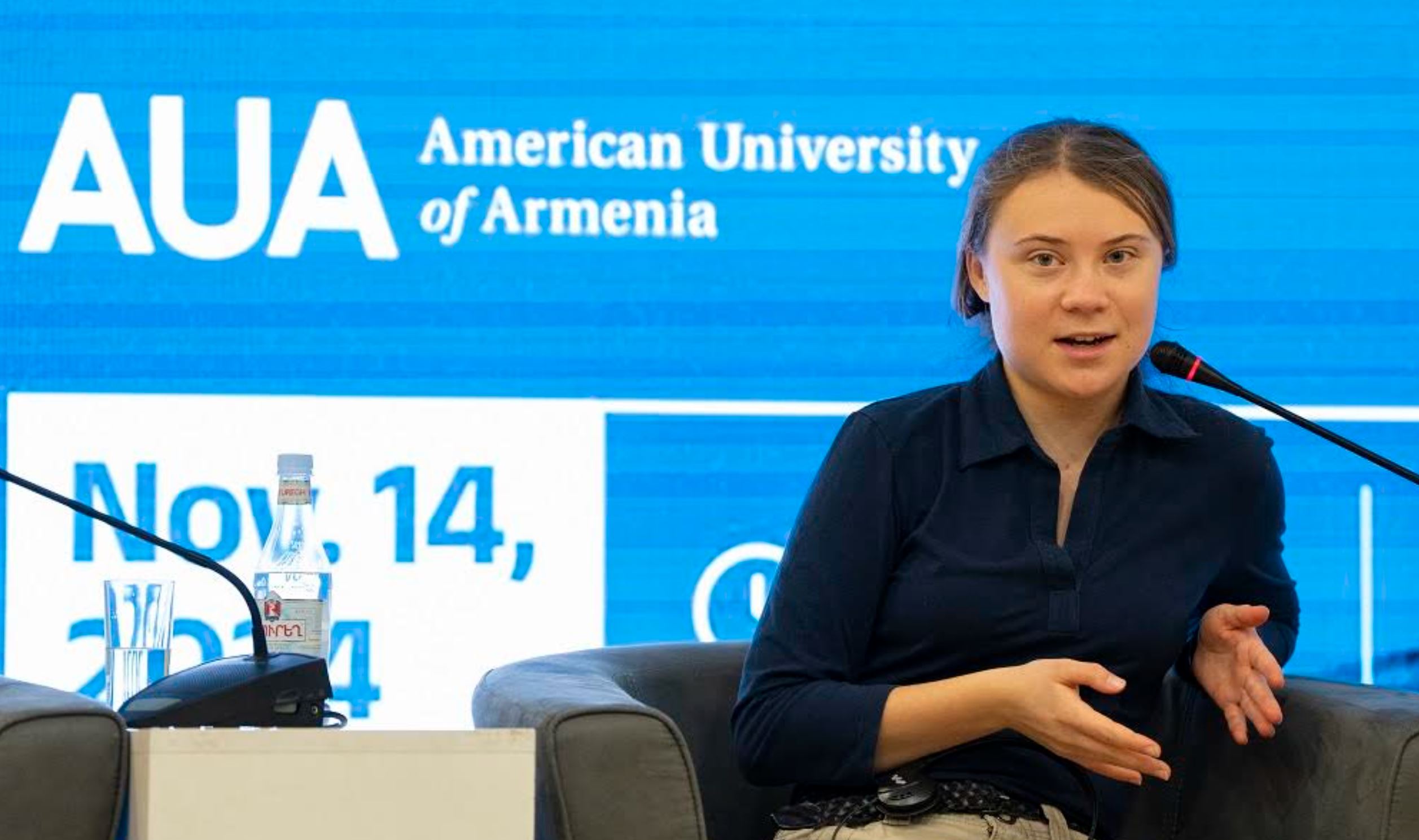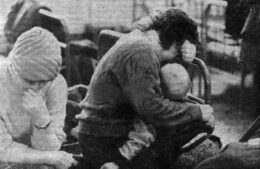Extreme hypocrisy: Greta Thunberg slams COP29 in Azerbaijan
- (0)

Climate Justice Activist Greta Thunberg Visits AUA
YEREVAN, Armenia — On November 14, the American University of Armenia (AUA) hosted internationally renowned climate justice activist Greta Thunberg. As part of her visit, Thunberg met with AUA President Dr. Bruce Boghosian and participated in a panel session.
Thunberg has been widely credited with raising global awareness about the climate crisis, in what has become known as “The Greta Effect.” She has been included in Time Magazine’s 100 most influential people, named the youngest Time Person of the Year, included in the Forbes list of the World’s 100 Most Powerful Women, and been nominated for the Nobel Peace Prize.
Thunberg was a featured panelist in the conference titled “The Impact of Azerbaijan’s Aggression on Human Rights and Environmental Protection,” which was hosted at AUA and organized in parallel to the 2024 United Nations (UN) Climate Change Conference (COP29). The event was a response to the UN’s decision to designate Azerbaijan as the host of COP29, despite grave concerns over its track record of aggression toward the people of Nagorno-Karabakh (Artsakh), as well as the authoritarian policies and Armenophobic rhetoric of President Ilham Aliyev.
The conference addressed the effects of Azerbaijan’s actions on both human rights and environmental protection in the region, including war crimes, blockades, ethnic cleansing, and damage to the environment and cultural heritage. It brought together lawyers, environmentalists, journalists, and other experts to discuss these critical issues. Shushanik Harutyunyan, a representative of the Armenian Climate Justice Initiative, delivered the opening remarks and introduced the main topics to be discussed. AUA President Dr. Bruce Boghosian then took to the stage to welcome the audience and thank Thunberg, along with all the notable guest speakers, for their participation. “The American University of Armenia is proud to host these pertinent panel discussions on topics of such pressing concern. Our institution, founded on the principles of academic freedom, intellectual discovery, and community impact, has always stood at the forefront of such important conversations, and I hope we always will. Indeed, you will have the chance today to hear from some of our own faculty, who are engaged in addressing these issues of human rights and environmental advocacy. I am proud to see them on this stage today,” remarked Dr. Boghosian.
The first panel, moderated by lawyer and human rights defender Luiza Vardanyan, focused on human rights violations and war crimes during the 2020 Artsakh War and featured speakers Ara Ghazaryan (LL.M. ’01), international law specialist; Anna Melikyan, legal expert at the Protection of Rights Without Borders NGO; Siranush Sahakyan, AUA lecturer, president of the Center for International and Comparative Law, and representative of the interests of Armenian POWs at the European Court of Human Rights; and Gegham Stepanyan (MPSIA ’16), human rights defender of the Republic of Artsakh. Each of the speakers provided unique insights into the complex legal, humanitarian, and geopolitical dimensions of the 2020 War, the subsequent blockade, and the full occupation of Artsakh in 2023. The discussions reinforced the importance of continued vigilance, international cooperation, and adherence to human rights laws, emphasizing the critical need to bring these issues to the attention of the international community.
At the end of the session, Thunberg was invited to the stage to deliver her keynote speech. “We need to stop hosting climate conferences in places like Azerbaijan, a country that is repressing its own population to an extreme degree,” she said, highlighting the intersection of climate justice and human rights. She continued by condemning the country’s ethnic cleansing of the entire population of Artsakh, Azerbaijan’s military aggressions, and its severe human rights violations, including torture, the keeping of hostages, and widespread violence. “If we are standing up for justice, that has to mean justice for everyone,” she concluded.
The second panel, moderated by Sona Ayvazyan, director of Transparency International, discussed the consequences of Azerbaijan’s aggression on environment and cultural heritage. Featured speakers included Victoria Burnazyan, vice president of Ecolur NGO; Dr. Irina Ghaplanyan, climate change expert and AUA adjunct lecturer; Armine Hayrapetyan, director of the State Service for the Preservation of the Historical Environment of Artsakh; and Tehmine Yenokyan, director of Green Armenia NGO. The speakers provided an in-depth analysis of the multifaceted impact of the Artsakh conflict on Artsakh’s environment and cultural landmarks, as well as Azerbaijan’s targeted destruction of and damage inflicted upon centuries-old monasteries, churches, and cultural sites.
Founded in 1991, the American University of Armenia (AUA) is a private, independent university located in Yerevan, Armenia, affiliated with the University of California, and accredited by the WASC Senior College and University Commission in the United States. AUA provides local and international students with Western-style education through top-quality undergraduate and graduate degree and certificate programs, promotes research and innovation, encourages civic engagement and community service, and fosters democratic values.



















